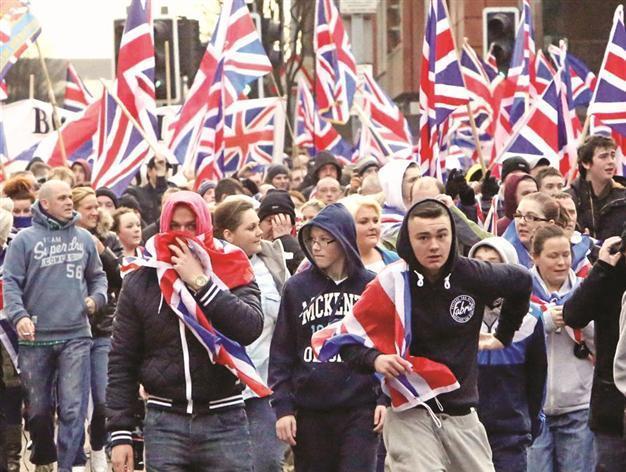Union Jack dispute returns to N Ireland
BELFAST - Agence France-Presse

Pro-British Loyalists hide their faces during a protest over the limited number of days the union flag is flown at the Belfast City Hall. EPA photo
Violence flared up again in Northern Ireland on Jan. 6, hours after politicians and Church leaders held talks in a bid to quell a row over the flying of the British flag.
After three nights of rioting and attacks on police in Belfast, Northern Ireland’s chief police officer Matt Baggott said 52 officers had been injured, but he warned his force would deal firmly with the violence for as long as it was necessary. A mob gathered and hurled steel barriers, bricks, fireworks and bottles at officers patrolling Castlereagh Street in the east of the city.
The rioting on Jan. 5 followed a largely peaceful demonstration by more than 1,000 people outside Belfast city hall against the city council’s decision last month to limit the days it flies the British flag, or Union flag, each year.
The ruling on Dec. 3 was viewed by pro-British loyalist groups as a concession too far to republicans who want Northern Ireland to be part of Ireland. Protesters immediately took to the streets and there have been on-off demonstrations in Belfast ever since. Police used water cannon and fired baton rounds in Belfast on Jan. 5 as they confronted more than 100 loyalist protesters who were throwing fireworks and bricks.
The discussions aimed at ending the violence took place at a Belfast church, but Robin Newton, of the Democratic Unionist Party, said a lack of engagement from protest organizers was making it difficult to see an end to the unrest.
“We have to find a way out of this, but how we do it I don’t know,” he admitted. Terry Spence, chairman of the Police Federation for Northern Ireland, which represents the interests of police officers, said the firing of shots at police proved that paramilitaries had infiltrated the protests.
The flag vote has raised tensions in the province, which was torn apart by three decades of sectarian violence until peace accords in 1998 led to the creation of a power-sharing government between Protestants and Catholics.
